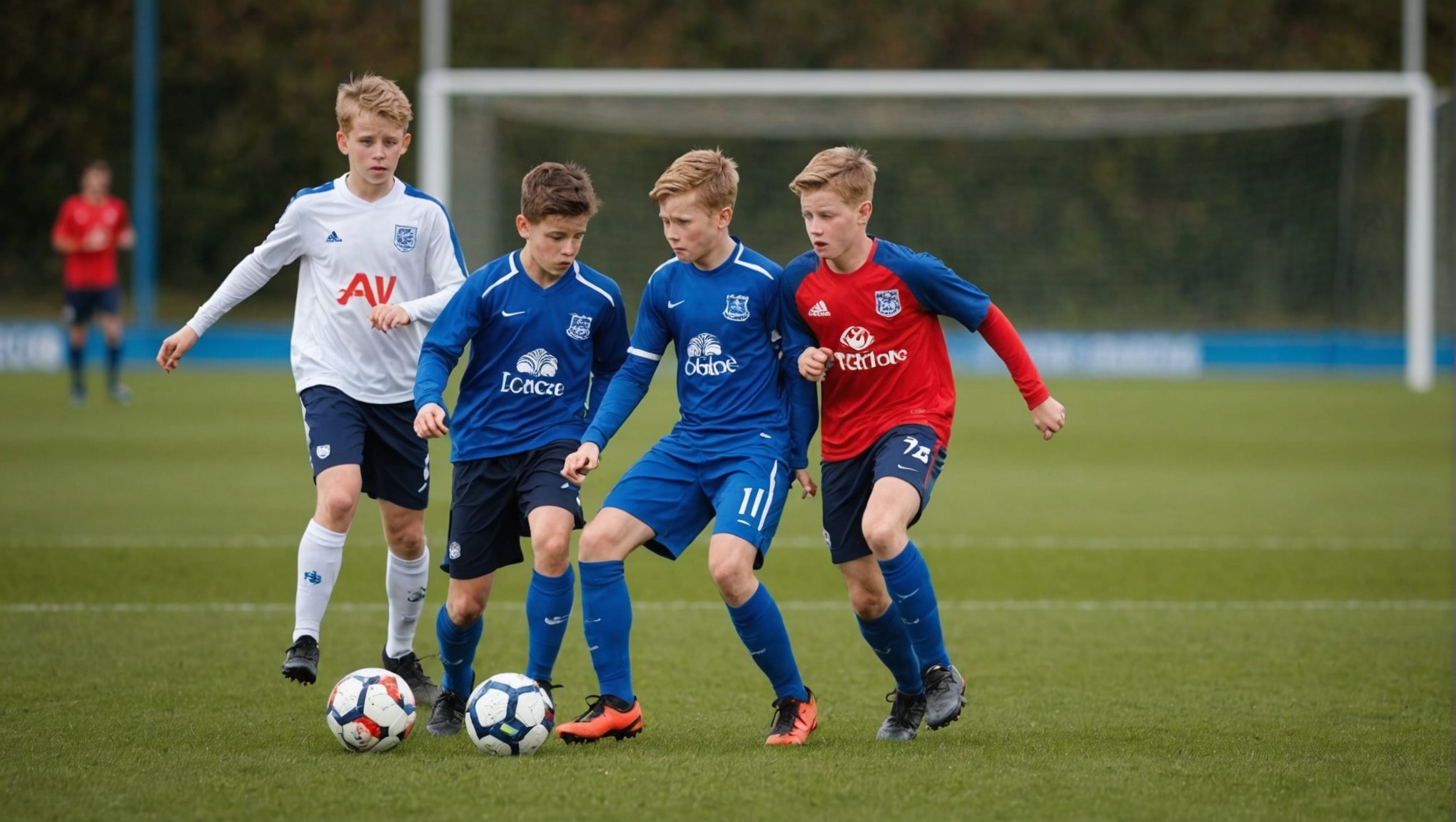Understanding the Current Landscape of Talent Development in UK Football Academies
The current trends in football academies highlight both innovation and challenges in developing young talent. UK academies strive to adapt their talent development systems to cater to evolving youth football trends. This adaptation involves integrating advanced training techniques and focusing on holistic player development.
Talent development systems focus on enhancing players’ technical skills, tactical understanding, and emotional intelligence. Academies aim to blend traditional coaching methods with modern approaches, such as sports science and data analytics, to maximise player growth. By doing so, they better prepare players for both national leagues and international competition.
Have you seen this : Enhancing Football Team Dynamics: Unique Off-Field Bonding Activities for On-Field Success
However, the pathway to success is not without its challenges. UK football academies face pressing issues, including scouting and retaining top-tier talent amid fierce competition. Additionally, they must balance a player’s academic commitments with athletic demands, ensuring a well-rounded development. Creating an environment that fosters mental resilience and motivation in young athletes is vital to overcoming these hurdles.
The current landscape showcases a dynamic environment where football academies are continuously innovating. By understanding these trends and challenges, stakeholders can better support the ongoing evolution of talent development in UK football.
In the same genre : Mastering Ball Control: Essential Drills for Football Players to Elevate Their Handling Skills
Key Strategies for Enhancing Training Programs
Creating effective training programs requires a deep understanding of age-appropriate methodologies. Tailoring training programs development to specific age groups can optimise learning and athletic growth, preventing burnout and reducing injury risk. For instance, younger players benefit from fun, engaging activities that develop fundamental skills and foster a love for the sport. Older athletes require more structured regimens focused on refining technique and tactical awareness.
Integrating technology and analytics into training programs is revolutionising how we approach player performance. Utilising data-driven insights allows coaches to pinpoint areas of improvement and customize training to individual needs. Technology such as wearables and performance tracking apps provides real-time feedback, transforming how athletes train and evolve.
Both physical conditioning and psychological support play crucial roles in a comprehensive training approach. Physical conditioning is essential for enduring the demands of sport, enhancing agility, strength, and stamina. Equally, psychological support is vital; strategies such as visualisation and stress management equip athletes to handle competitive pressures effectively. Incorporating these elements ensures a well-rounded program that nurtures not just the body, but also the mind, fostering overall athletic success.
Role of Mentorship in Player Development
Mentorship in football academies is a critical factor in fostering young talent. The essence of establishing mentor-mentee relationships lies in the supportive, nurturing environment they create, which is paramount for an aspiring athlete.
Mentorship often begins with experienced coaches recognising potential and taking proactive steps to guide young athletes. Such relationships enable young players to gain insights that go beyond technical skills, embracing tactics, discipline, and resilience. Experienced coaches bring a wealth of knowledge and perspectives that enrich a young athlete’s journey.
In many academies, mentoring models have proven their worth. Consider a case where a football academy incorporates structured interactions between senior players and novices. Here, younger players benefit from the practical wisdom and experience older athletes share. Coaches play a pivotal role, acting as advisors, role models, and sometimes gatekeepers who nurture a mentee’s passion.
The benefits of mentorship extend beyond the physical games. They help build confidence, instil a sense of belonging, and support personal growth. Effective mentorship creates a positive ripple through a player’s career, positively influencing their development on and off the field.
Best Practices for Engaging Young Athletes
Engaging youth in football requires creating a positive and inclusive training environment. Establish trust by fostering mutual respect among players and coaches. Embrace diversity by celebrating each team member’s unique abilities and encouraging teamwork. This approach enhances players’ self-confidence and promotes a welcoming atmosphere.
Encouraging self-expression and individual skill development is essential. Allow young athletes to explore different roles on the field, nurturing their ability to make decisions and take initiative. This can be achieved by offering varied, fun activities that align with their interests while still teaching core skills. A player-led approach increases their ownership and enthusiasm for the game.
The importance of feedback and communication in player engagement cannot be overstated. Offer constructive feedback that highlights strengths and areas for improvement, using clear, supportive language. Open, two-way communication builds trust and drives development.
Key strategies:
- Maintain a positive environment
- Encourage self-expression
- Provide constructive feedback
These practices not only enhance individual players’ enjoyment and growth but also promote a sense of community, helping young athletes to stay committed and passionate about football.
Case Studies of Successful UK Football Academies
Exploring football academies with successful talent development programs offers insights into effective training strategies. These academies are designed to foster young talent, nurturing them into professional players. Among the stellar examples is Southampton FC’s academy, renowned for its holistic approach, emphasising both technical skills and personal development. The academy’s training methods focus on individualised coaching, ensuring that each player receives tailored guidance.
Manchester United’s academy stands as a paragon for its history of producing exceptional talent, such as David Beckham and Marcus Rashford. Their success lies in a combination of traditional training techniques and innovative approaches like psychological coaching, which aids in mental resilience.
A critical factor in these academies is the use of state-of-the-art facilities, including advanced sports science technology to monitor and enhance player performance. Outcomes of these programs are visible in the trajectory of players like Gareth Bale, who transitioned from academy hopefuls to international stars.
Understanding the training strategies and success stories of these football academies not only highlights their effectiveness but also provides a roadmap for fostering future talents.
Addressing Challenges in Talent Development
Navigating the landscape of youth football training can present various challenges for academies striving to develop young talent. One primary obstacle is the financial and resource limitations many academies face. These include inadequate funding, which hampers their ability to provide top-notch facilities and coaching staff. Without sufficient resources, maintaining a comprehensive training programme becomes a significant hurdle. To address this, academies can employ creative strategies, such as forming partnerships with local businesses to secure sponsorships or collaborating with schools for shared facilities.
Another challenge is managing parental expectations and dealing with external pressures. Parents often have high hopes for their children’s future in football, which can sometimes be unrealistic. This pressure can affect not only the player but also the academy’s operational focus. Effective communication is vital. Establishing a transparent dialogue with parents can help align expectations and ensure that everyone involved understands the development process and goals.
Overcoming these obstacles is crucial for nurturing young talent. By employing strategic solutions, academies can enhance their training environments and support players, empowering them to reach their full potential in the competitive world of football.
The Future of Talent Development in Football
In the future of football training, embracing technological advancements will be crucial. Emerging trends suggest a pivotal shift towards data-driven training programs to enhance youth players’ performance. These programs use analytics to tailor training protocols individually, maximising each player’s potential. For instance, wearable tech can track biometric data, providing insights into areas needing improvement and tailoring rehabilitation processes effectively.
The globalisation of football offers both opportunities and challenges for local talent development. With easier access to international expertise and diverse techniques, local academies can integrate best practices from around the world. However, they must also navigate the risk of diminishing local playing styles. Successfully blending global influences with local flair could shape the future of football training significantly.
Additionally, continuous education and adaptation are vital for coaches and staff in this dynamic environment. To foster talent effectively, they need to stay updated with evolving methodologies, adopting a learner’s mindset and welcoming change. Engaging in workshops, certifications, and international collaborations can empower them to push the boundaries of traditional training methods. This commitment to growth and innovation is essential for thriving in the future of football training.






